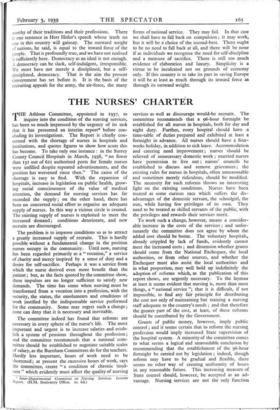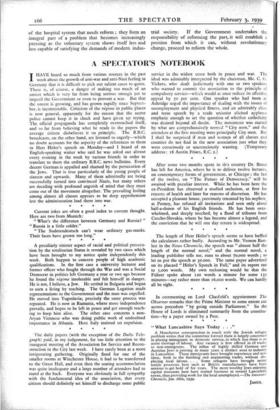THE NURSES' CHARTER
THE Athlone Committee, appointed in 1937, to inquire into the condition of the nursing services, has been so much impressed by the urgency of its task that it has presented an interim report* before con- cluding its investigations. The Report is chiefly con- cerned with the shortage of nurses in hospitals and institutions, and quotes figures to show how acute this has become. To take only one instance : in the Surrey County Council Hospitals in March, 1938, " no fewer than 151 out of 621 authorised posts for female nurses were unfilled despite repeated advertisements, and the position has worsened since then." The cause of the shortage is easy to find. With the expansion of hospitals, increase in legislation on public health, grow- ing social consciousness of the value of medical attention, the demand for nursing services has far exceeded the supply ; on the other hand, there has been no concerted social effort to organise an adequate supply of nurses. In this way a vicious circle is created. The existing supply of nurses is exploited to meet the increased demand; conditions deteriorate, and new recruits are discouraged.
The problem is to improve conditions so as to attract a greatly increased supply of recruits. This is hardly possible without a fundamental change in the position nurses occupy in the community. Until now, nursing has been regarded primarily as a " vocation," a service of charity and mercy inspired by a sense of duty and a desire for self-sacrifice. Perhaps it was a service from which the nurse derived even more benefit than the patient ; but, as the facts quoted by the committee show, these impulses are no longer sufficient to satisfy new demands. The time has come when nursing must be transformed from a vocation into a profession, with the security, the status, the emoluments and conditions of work justified by the indispensable service performed for the community. Some may regret such a change ; none can deny that it is necessary and inevitable.
The committee indeed has found that reforms are necessary in every sphere of the nurse's life. The most important and urgent is to increase salaries and estab- lish a system of pensions throughout the profession ; and the committee recommends that a national com- mittee should be established to negotiate suitable scales of salary, as the Burnham Committees do for the teachers. Hardly less important, hours of work need to be shortened; at present the excessive hours of work, says the committee, create " a condition of chronic tired- ness " which evidently must affect the quality of nursing Inter-Departmental Committee on Nursing Services. Interim Report. (H.M. Stationery Office. is. 6d.) services as well as discourage would-be recruits. The committee recommends that a 96-hour fortnight be established for all nurses in hospitals, both for day and night duty. Further, every hospital should have a time-table of duties prepared and exhibited at least a fortnight in advance. All nurses should have a four- weeks holiday, in addition to sick leave. Accommodation and catering need improvement ; nurses should be relieved of unnecessary domestic work ; married nurses have permission to live out ; nurses' councils be established to discuss and remove grievances ; the existing rules for nurses in hospitals, often unreasonable and sometimes merely ridiculous, should be modified. The necessity for such reforms throws an interesting light on the existing conditions. Nurses have been treated as some curious race which suffers the dis- advantages of the domestic servant, the schoolgirl, the nun, while having few privileges of its own. They need to be treated as skilled servants of the public, with the privileges and rewards their services merit.
To work such a change, however, means a consider- able increase in the costs of the services ; and unfor- tunately the committee does not agree by whom the added cost should be borne. The voluntary hospitals, already crippled by lack of funds, evidently cannot meet the increased costs ; and dissension whether grants should come from the National Exchequer, the local authorities, or from other sources, and whether the Exchequer must also assist the local authorities and in what proportion, may well hold up indefinitely the adoption of reforms which, as the publication of this report shows, are urgently necessary. To the layman at least it seems evident that nursing is, more than most things, a " national service "; that it is difficult, if not impossible, to find any fair principle for distributing the cost not only of maintaining but training a nursing staff adequate to the country's needs ; and that therefore the greater part of the cost, at least, of these reforms should be contributed by the Government.
Grants of public money, however, imply public control ; and it seems certain that to reform the nursing profession would imply increased State supervision of the hospital system. A minority of the committee comes to what seems a logical and unavoidable conclusion by recommending that the establishment of the 96-hour fortnight be carried out by legislation ; indeed, though reform may have to be gradual and flexible, there seems no other way of creating uniformity of hours in any reasonable future. This increasing measure of State control should, however, be accepted as an ad- vantage. Nursing services are not the only function of the hospital system that needs reform ; they form an integral part of a problem that becomes increasingly pressing as the voluntary system shows itself less and less capable of satisfying the demands of modem indus- trial society. If the Government undertakes the responsibility of reforming the part, it will establish a position from which it can, without revolutionary change, proceed to reform the whole.











































 Previous page
Previous page